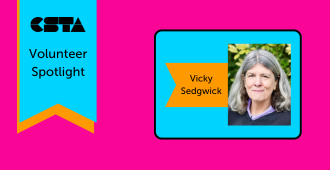Welcome to the CSTA Volunteer Spotlight series, where we celebrate the incredible individuals who dedicate their time and passion to making a difference in the CSTA community. Join us in recognizing and appreciating the extraordinary efforts of Vicky in their role as Reflective Teachers Member, Conference Committee.
What inspired you to volunteer your time with CSTA? How has this experience impacted you?
It’s simple. Someone asked me. I hadn’t thought about volunteering until I was asked. Being involved as a volunteer with CSTA has expanded my world. It has helped me be a better teacher and develop as a leader in elementary computer science.
How long have you been involved with CSTA, and what motivated you to join?
My first involvement with CSTA was in 2012 when I happened upon the website as I was searching online for what K-8 students might be able to do with programming. I had taken a job as the technology teacher at my daughter’s school a little over a year before and was tired of just teaching productivity applications and watching students type during their classes with me. I had a background as a programmer and systems analyst and thought that there might be a way to bring that into my classes but wasn’t sure where to start. I found the CSTA Standards and began adding computer science to the classes I taught. I joined CSTA shortly after I found the site because I wanted to be connected to what was happening at CSTA and with others teaching computer science to kids. I’ve been a CSTA+ member since that program existed because I believe in supporting organizations that support me.
Can you share any memorable experiences or highlights from your involvement with CSTA?
There have been a lot of memorable experiences and highlights, but my experiences on the conference committee definitely stand out. The first conference I attended in 2016 had some elementary sessions, but there were times when there weren’t really any available. At that conference, I was asked to join the conference committee to represent elementary CS teachers. It has been amazing to be a part of the transformation of the conference into one that now includes sessions for all teachers of CS from the youngest grades through high school. The committee now has a whole subcommittee representing elementary teachers along with subcommittees for middle school, high school, coaches, and one focused on equity. It has been very rewarding to be a part of this.
How has CSTA impacted your teaching career and professional development?
Finding the CSTA Standards and CSTA changed what I was teaching and helped me identify where I should focus my professional learning. I had also been presenting on EdTech topics at various events, and as I started to add more computer science to my curriculum, I also changed what I presented on to CS-related topics. But the biggest impact that CSTA has had on me is the network that it provided me. The biggest impact that CSTA has had on my career was helping me to find my people — people I can bounce ideas off of, people I can learn from, people I now consider friends.
In what ways do you see CSTA shaping the future of computer science education?
First, with the standards for students. Many states adopted or adapted the 2017 standards, and now that it’s time to revise them, CSTA can again influence what K-12 students should focus on when it comes to CS education. I also see CSTA continuing to provide quality professional development for CS teachers through conferences, summits, and online courses.
Are there any specific initiatives or projects within CSTA that you’ve been particularly passionate about?
My involvement with CSTA began with the K-12 student standards and I am still passionate about the standards, both for students and for teachers. As a CSTA volunteer, I was on the Elementary writing team for the 2017 K-12 CSTA Standards and on the writing team for the Standards for CS Teachers. I was also the K-2 grade band lead on the AI4K12 initiative which was sponsored by AAAI and CSTA.
What does the future of CSTA look like?
As more states (and other countries) mandate computer science education, I see CSTA as a major organization to support those who will be teaching CS in K-12. CSTA is positioned to provide platforms and professional development to support teachers and impact students. I would love to see CSTA form partnerships with other organizations in K-12 education and encourage local chapters to become involved with these organizations to help CSTA grow and others learn more about K-12 CS education.

